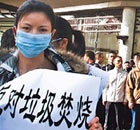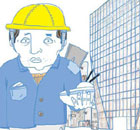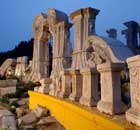Op-Ed Contributors
Embarrassment between black and white
By Zhang Ming (China Daily)
Updated: 2010-01-18 07:54
 |
Large Medium Small |
The property disclosure system, an international practice for civil servants, is somewhat difficult to implement in China. Reportedly, over 90 percent of officials do not agree with this system. Media exposure of the sentiment also reinforced an impression that the public is not quite happy with delays in the disclosure.
Scrutiny of the regulation shows it is premature to implement the practice before structural problems are resolved. Government officials are called cadres in their bureaucratic hierarchy. On the one hand, officials have long been portrayed as parenting guardians of local residents. On the other hand, public servants are administrative leaders of the mass. The two relations tangle up and distort the officials' attitudes toward their commitment and the public. Some people still regard appealing to the authority as their last resort in solving problems. Government officials sometimes also deem the people as their children and even err on the side of controlling information flow because they fear that the public will be poisoned by adverse thoughts.
It is inappropriate to demand that power elites open their pockets to the public in such a self-conflicting social structure. How can "children" ask "parents" to disclose their property?
| ||||
Another fact cannot be neglected. The income of allegedly corrupt government officials consists of legal or illegal contributions. And the blurry boundary between legal and illegal income has provided most officials with ample room to camouflage their dirty laundry. A huge gray zone exists in the unambiguously illegal corruption income issue.
There is always gray income. It is conveniently impossible to label this as completely legal or illegal. No one can easily deny the fact that a considerable proportion of the millions of civil servants have easy access to gray income. The earliest recorded gray income approved officially dates back to the reign of Yong Zheng Emperor of the Qing Dynasty (1644-1911), when the central royal court imposed hao xian, additional taxes and grain levies to cover the costs and losses incurred in taxation and transportation. Some of the additional income was set aside to foster honesty and integrity among officials as bonuses.
We may still learn lessons from the old model. It is no secret that the legal income of civil servants is limited now, compared to that of the middle class in China. But they have every opportunity to benefit from gray incomes. Some say it is almost an impossible mission to restrict the income of government employees within legal boundaries because of the nation's wealth distribution system.
Only when the number of government employees is reduced by a large margin can the possibility of increasing their legal income be put on an agenda to elbow away gray incomes. Once the boundary between white and black becomes clear-cut, it is practical to monitor an official's performance through property disclosures. Even if property disclosure is ruled as legally compulsory now, it may exist in name only, for we cannot expect too much from a self-monitored system. Structural and mental changes can sweep away most obstacles on the way to spontaneous observances. Public opinion can be channeled in the right direction to push for changes to the social structure in order to guarantee that the property disclosure regulation is an entrenched routine in China.
The author is a professor at Renmin University of China.
(China Daily 01/18/2010 page8)













